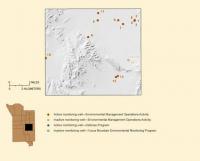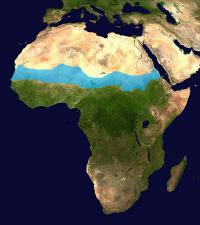-
U.K. to destroy biometric information of 45 terror suspects due to botched paperwork
British security agencies will have to destroy fingerprints and DNA of forty-five terror suspects because the police retained the biometric samples longer than the law allows. The law does allow the police to keep biometric information of terrorism suspects indefinitely, but certain paperwork must be completed within a certain period of time to allow that, and if the paperwork is not completed, the samples must be destroyed. A new report reveals that Britain holds biometric information and materials on nearly 8,000 suspects.
-
-
U.S. captures head of ISIS chem weapons unit; targets ISIS chem weapons infrastructure

U.S. Special Forces operating in Iraq captured the head ISIS chemical weapons unit. Sleiman Daud al-Afari, who worked for Saddam Hussenin’s now-disbanded Military Industrialization Authority where he specialized in chemical and biological weapons, was captured during a raid near the northern Iraqi town of Tal Afar last month.American and Iraqi officials say that there are many indications that ISIS is working hard to develop chemical weapons.
-
-
Trump’s campaign rhetoric, ISIS and the law of war
Presidential candidate Donald Trump said that one reason the U.S. war against ISIS is “ineffective” is that “We’re fighting a very politically correct war.” Exactly what Trump is suggesting doing is not clear, but it is significant that Trump recently acknowledged that the U.S.“is bound by laws and treaties” and that as president he would “not order a military officer to disobey the law.” Instead, he said he would “seek [the] advice” of military and other officials. This is good news, and something all the candidates – and their critics – ought to embrace, as applying the law of war in the twenty-first century is much more complicated than many think. Words do matter, and where the nation’s security is concerned, no words can be more important..
-
-
State-level immigration policies should be subject of cost-benefit analysis
While immigration policy has been the purview of the U.S. federal government, nearly all states have taken a more-active role on the issue of unauthorized immigration in the past fifteen years through actions such as making drivers licenses available regardless of immigration status and requiring employers to verify eligibility to work, according to a new study. States, however, rarely examine the costs and benefits of such policies before enacting them, suggesting the need for a comprehensive tool to help state policymakers assess the full range of costs and benefits of immigration policies before they are adopted.
-
-
Senior ISIS leader Abu Omar al-Shishani killed in U.S. strike

Abu Omar al-Shishani, a Syrian-based Georgian national who was a senior ISIS leader, was killed in a 4 March air strike by the U.S.-led coalition. U.S. officials said that the militant was killed near the Syrian town of al-Shadad. He had a reputation as a close military adviser to ISIS’s leader Abu Bakr al-Baghdadi, who relied heavily on Shishani.
-
-
ISIS plotted to kidnap Malaysia’s prime minister, other high officials
Ahmad Zahid Hamidi, Malaysia’s deputy prime minister, said Malaysia had foiled a plot by ISIS to kidnap government leaders, including the country’s prime minister. Hamidi to say that jihadists attempted to kidnap him and two other Malaysian officials — including the prime minister Najib Razak and the defense minister, Hishammuddin Hussein.
-
-
Secretive Area 6 used to test aerial radiation detection equipment

Top-secret Nevada site – even more secret than neighboring Area 51 — is used by Pentagon, DHS to test drones equipped with sensors to detect radioactive material which could be used in dirty bombs. The site, located in Yucca Flat, was once used for nuclear testing.
-
-
U.S. air strikes kills 150 al-Shabaab militants in Somalia

Strikes by U.S. drone ad manned aircraft has killed 150 al-Shabaab fighters in Somalia, the Pentagon said on Monday. The strikes were conducted on Saturday against the Raso Camp, 120 miles north of Mogadishu, where the al-Qaeda-affiliated Islamist group built a training facility.
-
-
ISIS hackers post N.J. police officers’ details online, calling on followers to attack them

ISIS hackers have posted the personal details of U.S. officials online, encouraging the group’s supporters to carry out “lone wolf” attacks against them. The Caliphate Cyber Army (CCA), formerly known as the Islamic Cyber Army, posted the personal details of fifty-five New Jersey police officers last week after hacking into the Web site of the New Jersey Transit police.
-
-
The staggering cost of war to Syria, neighbors

A new report evaluates the economic losses to Syria, Lebanon, Jordan, and Turkey to date and into the future. The report concludes that the cost of conflict to Syria is an estimated $275 billion in lost growth opportunities. If the conflict continues to 2020, the cost of conflict to Syria will be $1.3 trillion.
-
-
Calif. terrorists’ iPhone may have been used to introduce malware into data networks: DA

San Bernardino County District Attorney Michael Ramos has advanced what experts describe as an unusual reason for forcing Apple to allow the FBI to break the password of the iPhone used by the two terrorists as part of the agency’s investigation of the attack. Ramos says the phone might have been “used as a weapon” to introduce malicious software to county computer systems.
-
-
Dissident republicans’ weapons cache discovered in Northern Ireland
Police Service of Northern Ireland (PSNI) has discovered a terrorist weapons cache in a forest park in Northern Ireland. Police have been warning for a whole that dissidents republicans were planning to ramp up violence in the run-up to the centenary of the 1916 Easter Rising against British rule in Dublin.
-
-
Four African innovators selected for engineering innovation prize
Following an open, competitive, application process which saw entries from fifteen countries in sub-Saharan Africa, twelve African entrepreneurs were chosen to receive a package of six months of business training and mentoring from the U.K.’s Royal Academy of Engineering. The four finalists showing the greatest promise have now been chosen, and are in with a chance to become the overall winner. Each will receive at least £10,000 with the grand prize of £25,000 to be awarded at a ceremony in Cape Town on 1 June. A low-cost sustainable water filter system to provide clean and safe drinking water, and a service that allows African mobile phone users to switch easily between multiple mobile networks are among the four African innovations selected by the Academy.
-
-
U.S. to send troops to Nigeria to help fight Boko Haram
Hundreds of U.S. military advisers would soon be on their way to the front lines of the battle raging in north-east Nigeria and neighboring countries against the Islamist Nigerian insurgency Boko Haram. The plan to send U.S. military personnel to the area was as part of a recent confidential assessment by the top U.S. Special Operations commander for Africa, Brig. Gen. Donald C. Bolduc.
-
-
Sahel youths susceptible to radicalization: UN envoy

Hiroute Guebre Sellassie, UN envoy to the Sahel region in Africa, said last week that up to forty-one million young people in the Sahel have nothing hut a bleak future to look to, pushing them to migrate and making them susceptible to radicalization. She said that young people under age 25 in Burkina Faso, Chad, Mali, Mauritania, and Niger “face hopelessness.” She noted that 44 percent of children in the Sahel lack access to primary education and only 36 percent of the population can read or write.
-
More headlines
The long view
What Does Netflix’s Drama “Adolescence” Tell Us About Incels and the Manosphere?
While Netflix’s psychological crime drama ‘Adolescence’ is a work of fiction, its themes offer insight into the very real and troubling rise of the incel and manosphere culture online.
A Shining Star in a Contentious Legacy: Could Marty Makary Be the Saving Grace of a Divisive Presidency?
While much of the Trump administration has sparked controversy, the FDA’s consumer-first reforms may be remembered as its brightest legacy. From AI-driven drug reviews to bans on artificial dyes, the FDA’s agenda resonates with the public in ways few Trump-era policies have.
The Center Can Hold — States’ Rights and Local Privilege in a Climate of Federal Overreach
As American institutions weather the storms of executive disruption, legal ambiguity, and polarized governance, we must reexamine what it means for “the center” to hold.
How to Reverse Nation’s Declining Birth Rate
Health experts urge policies that buoy families: lower living costs, affordable childcare, help for older parents who want more kids
Foundation for U.S. Breakthroughs Feels Shakier to Researchers
With each dollar of its grants, the National Institutes of Health —the world’s largest funder of biomedical research —generates, on average, $2.56 worth of economic activity across all 50 states. NIH grants also support more than 400,000 U.S. jobs, and have been a central force in establishing the country’s dominance in medical research. Waves of funding cuts and grant terminations under the second Trump administration are a threat to the U.S. status as driver of scientific progress, and to the nation’s economy.
The True Cost of Abandoning Science
“We now face a choice: to remain at the vanguard of scientific inquiry through sound investment, or to cede our leadership and watch others answer the big questions that have confounded humanity for millennia —and reap the rewards.”
